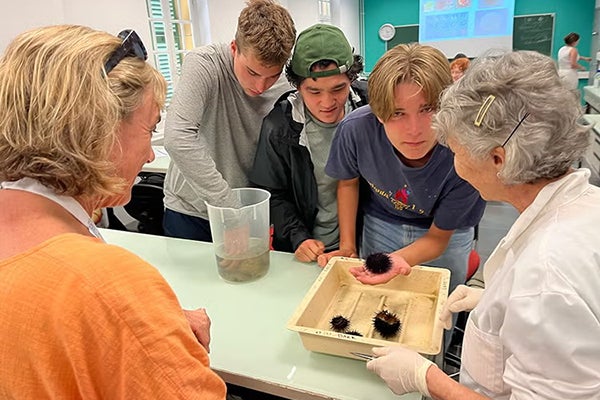Urban Gardens Are Good for Ecosystems and Humans
Traditionally, it has been assumed that cultivating food leads to a loss of biodiversity and negative impacts on an ecosystem.

A new study found that urban gardens are beneficial for biodiversity, ecosystems and humans. Image courtesy of UCSC.
Traditionally, it has been assumed that cultivating food leads to a loss of biodiversity and negative impacts on an ecosystem. A new study from researchers at multiple universities, including The University of Texas at Austin, defies this assumption, showing that community gardens and urban farms positively affect biodiversity, local ecosystems and the well-being of humans that work in them.

A green sweat bee in a native wildflower. Image courtesy of UCSC.
The study, published in Ecology Letters, looked at 28 urban community gardens across California over five years and quantified biodiversity in plant and animal life, as well as ecosystem functions such as pollination, carbon sequestration, food production, pest control and human well-being.
"We wanted to determine if there were any tradeoffs in terms of biodiversity or impacts on ecosystem function," said Shalene Jha, an associate professor of integrative biology who was lead author on the paper. "What we found is that these gardens, which are providing tremendous nutritional resources and increasing well-being for gardeners, are also supporting incredibly high levels of plant and animal biodiversity. It's a win-win."
Previous assumptions by scientists about the negative effect of food production on biodiversity have been almost entirely based on intensive rural agriculture enterprises that tend to grow only one or two types of crops, often at a massive scale. Urban community gardens, private gardens, and urban farms and orchards tend to grow more types of plants in smaller areas. This new study is the first to explore the effects of urban gardens across a wide range of biodiversity measures and ecological services.

Courtesy of UCSC.
"It's estimated that by 2030, about 60% of the world's population will live in cities," Jha said. "And urban farms and gardens currently provide about 15%-20% of our food supply, so they are essential in addressing food inequality challenges. What we're seeing is that urban gardens present a critical opportunity to both support biodiversity and local food production."
The study also found that the choices that gardeners make can have a large impact on their local ecosystem. For instance, planting trees outside crop beds could increase carbon sequestration without limiting pollinators or decreasing food production from too much shade. And mulching only within crop beds could help improve soil carbon services, while avoiding negative effects on pest control and pollinators.
The research was funded by the U.S. Department of Agriculture's National Institute of Food and Agriculture, the National Science Foundation, and grants from the University of California. Monika Egerer, Peter Bichier, Hamutahl Cohen, Stacy M. Philpott and Azucena Lucatero of UC Santa Cruz, Heidi Liere of Seattle University and Brenda Lin of CSIRO Land and Water Flagship in Australia were co-authors of the study.



